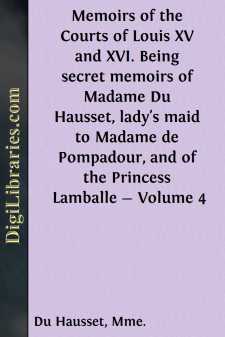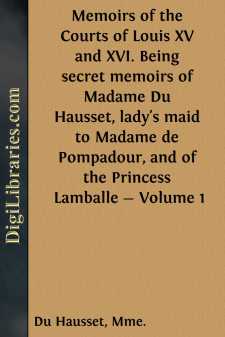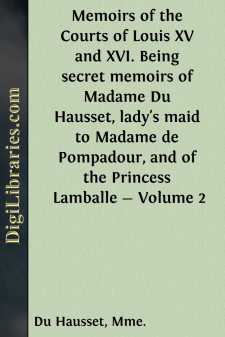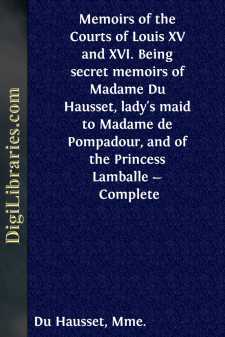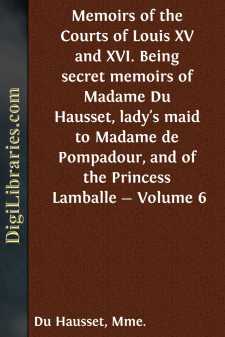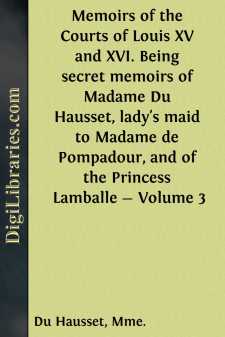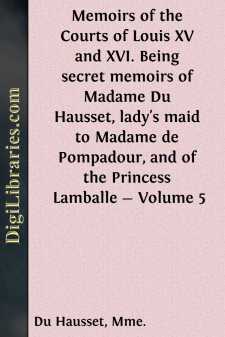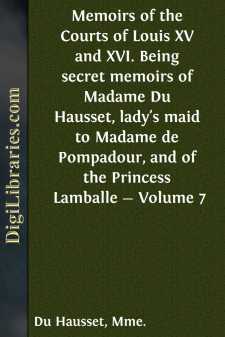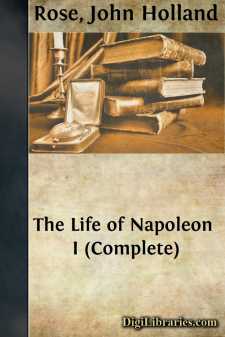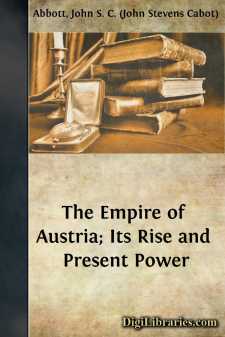Categories
- Antiques & Collectibles 13
- Architecture 36
- Art 48
- Bibles 22
- Biography & Autobiography 813
- Body, Mind & Spirit 142
- Business & Economics 28
- Children's Books 15
- Children's Fiction 12
- Computers 4
- Cooking 94
- Crafts & Hobbies 4
- Drama 346
- Education 46
- Family & Relationships 57
- Fiction 11828
- Games 19
- Gardening 17
- Health & Fitness 34
- History 1377
- House & Home 1
- Humor 147
- Juvenile Fiction 1873
- Juvenile Nonfiction 202
- Language Arts & Disciplines 88
- Law 16
- Literary Collections 686
- Literary Criticism 179
- Mathematics 13
- Medical 41
- Music 40
- Nature 179
- Non-Classifiable 1768
- Performing Arts 7
- Periodicals 1453
- Philosophy 64
- Photography 2
- Poetry 896
- Political Science 203
- Psychology 42
- Reference 154
- Religion 513
- Science 126
- Self-Help 84
- Social Science 81
- Sports & Recreation 34
- Study Aids 3
- Technology & Engineering 59
- Transportation 23
- Travel 463
- True Crime 29
Memoirs of the Courts of Louis XV and XVI. Being secret memoirs of Madame Du Hausset, lady's maid to Madame de Pompadour, and of the Princess Lamballe - Volume 4
by: Mme. Du Hausset
Categories:
Description:
Excerpt
"The accession of Louis XVI. and Marie Antoinette to the crown of France took place (May 10, 1774) under the most propitious auspices!
"After the long, corrupt reign of an old debauched Prince, whose vices were degrading to himself and to a nation groaning under the lash of prostitution and caprice, the most cheering changes were expected from the known exemplariness of his successor and the amiableness of his consort. Both were looked up to as models of goodness. The virtues of Louis XVI. were so generally known that all France hastened to acknowledge them, while the Queen's fascinations acted like a charm on all who had not been invincibly prejudiced against the many excellent qualities which entitled her to love and admiration. Indeed, I never heard an insinuation against either the King or Queen but from those depraved minds which never possessed virtue enough to imitate theirs, or were jealous of the wonderful powers of pleasing that so eminently distinguished Marie Antoinette from the rest of her sex.
"On the death of Louis XV. the entire Court removed from Versailles to the palace of La Muette, situate in the Bois de Boulogne, very near Paris. The confluence of Parisians, who came in crowds joyfully to hail the death of the old vitiated Sovereign, and the accession of his adored successors, became quite annoying to the whole Royal Family. The enthusiasm with which the Parisians hailed their young King, and in particular his amiable young partner, lasted for many days. These spontaneous evidences of attachment were regarded as prognostics of a long reign of happiness. If any inference can be drawn from public opinion, could there be a stronger assurance than this one of uninterrupted future tranquility to its objects?
"To the Queen herself it was a double triumph. The conspirators, whose depravity had been labouring to make her their victim, departed from the scene of power. The husband, who for four years had been callous to her attractions, became awakened to them. A complete change in the domestic system of the palace was wrought suddenly. The young King, during the interval which elapsed between the death and the interment of his grandfather, from Court etiquette was confined to his apartments. The youthful couple therefore saw each other with less restraint. The marriage was consummated. Marie Antoinette from this moment may date that influence over the heart (would I might add over the head and policy!) of the King, which never slackened during the remainder of their lives.
"Madame du Barry was much better dealt with by the young King, whom she had always treated with the greatest levity, than she, or her numerous courtiers, expected. She was allowed her pension, and the entire enjoyment of all her ill-gotten and accumulated wealth; but, of course, excluded from ever appearing at Court, and politically exiled from Paris to the Chateau aux Dames.
"This implacable foe and her infamous coadjutors being removed from further interference in matters of State by the expulsion of all their own Ministers, their rivals, the Duc de Choiseul and his party, by whom Marie Antoinette had been brought to France, were now in high expectation of finding the direction of the Government, by the Queen's influence, restored to that nobleman....


